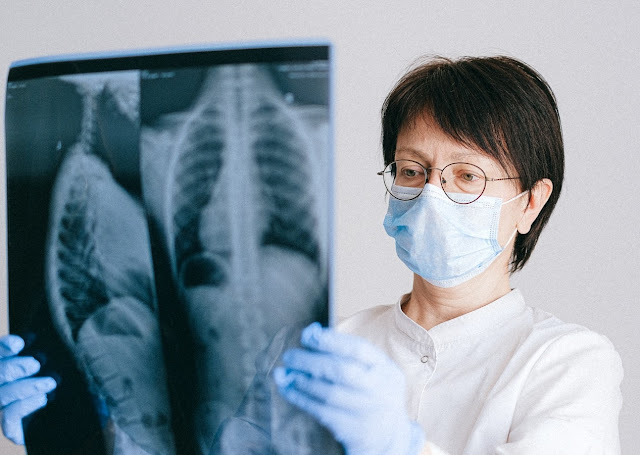Being 'Glutened' - What Happens
What if I told you that from now until forever, every time you eat food with 'an ingredient' in it, you'll feel sick for roughly a week, and not just sick, but unable to do normal work, not even basic housework or answering phones at the office? What if this 'something' was only lightly regulated, so that food manufacturers wouldn't have to tell you, that food they sold you was contaminated with the ingredient. But they could advertise (on an honor system) that their food doesn't contain 'it' and charge you a premium for its absence? What if the ingredient was a staple of society's food system and could be hidden in almost any food under dozens of alternate names, making identification difficult? The 'ingredient' I'm talking about is gluten, and for about 1.5 billion people worldwide, this is a good description of their relationship with gluten.
That might seem like a large number. It is. The world population right now is 7.6 billion. My estimate is based on that, first, some people don't feel glutened but their body produces antibodies to gluten anyway, and the most accepted rough estimate is that, about 30% of people have sensitivity to gluten in some way (Allergy, Celiac or NCGS). So I chose my estimate based on roughly 20% of people having a functional reaction to gluten. That should be conservative enough to cover any objections but the most strident. Some researchers believe there are as many as 50% of the population sensitive or reactive to gluten, but not diagnosed, because our usual diagnostic measures are inadequate, or they exclude relevant genetics, or they exclude relevant biomarkers, etc..
For the 0.02% of people who currently have a Celiac disease diagnosis, there is the option of paid or unpaid time off from work, due to a person with a disability, invisible disability or chronic illness. But, for the vast majority of sufferers, we don't have that option. For most, this is an "invisible" disease but DOES NOT provide eligibility for health benefits related to it. Most people with gluten reactions are self-advocating for more time off from work, or even unpaid leave without the benefit of having a medical record to back that up. This is more poignant when attempted by a woman with professional qualifications. Not only is she more likely to need such consideration, she is also more likely to be seen as someone who fakes her illness by both her doctor and her boss.
When I'm not glutened, I often try to make up for the time lost by putting a lot of effort into my performance. But even so, the world doesn't cooperate with me to prevent such risks. I suspect many other people have a sudden loss of work effectiveness when glutened and if we add up the costs in lost work hours, it would come to a significant sum. I was near to asking for permanent disability before going gluten free made it possible for me to hope for work again. And it makes no sense to me that my kryptonite is hidden in so many things, and so weakly regulated. After all, I'm not the only one, and a case can be made for gluten negligence being a gender issue.
 |
| Created by Yanalya - Freepik.com |
That might seem like a large number. It is. The world population right now is 7.6 billion. My estimate is based on that, first, some people don't feel glutened but their body produces antibodies to gluten anyway, and the most accepted rough estimate is that, about 30% of people have sensitivity to gluten in some way (Allergy, Celiac or NCGS). So I chose my estimate based on roughly 20% of people having a functional reaction to gluten. That should be conservative enough to cover any objections but the most strident. Some researchers believe there are as many as 50% of the population sensitive or reactive to gluten, but not diagnosed, because our usual diagnostic measures are inadequate, or they exclude relevant genetics, or they exclude relevant biomarkers, etc..
I will honestly say that all these numbers are very much disputed and controversial. It will probably be decades before we have more clarity on the subject. And in the meantime, roughly 1.5 billion people will have to have lives, raise children, visit with their grandchildren, and make a contribution to their society, while feeling ill on a regular basis.
A majority of these people are women, because while it happens to men too, women tend to have worse symptoms. One theory is that testosterone protects men from some aspects of autoimmune illness. If true, that may explain why so many women with gluten related illness also have PCOS, an illness that causes reproductive effects, and one of the effects is a high testosterone level in women.I often see symptoms of gluten reactions being dismissed or minimized. Some articles and books are written as if, preventing gut damage is the only goal of treatment, with the gluten free diet (GFD). Small intestine damage is certainly the most dangerous in terms of people's lives being at risk. However, the glutened reaction can cause symptoms so severe that people are excessively absent from work, or if they force themselves to go to work (due to a strict attendance policy), they can't function for days. If they have symptoms that cause ataxia or loss of consciousness, then going to work can even be dangerous to others around them.
For the 0.02% of people who currently have a Celiac disease diagnosis, there is the option of paid or unpaid time off from work, due to a person with a disability, invisible disability or chronic illness. But, for the vast majority of sufferers, we don't have that option. For most, this is an "invisible" disease but DOES NOT provide eligibility for health benefits related to it. Most people with gluten reactions are self-advocating for more time off from work, or even unpaid leave without the benefit of having a medical record to back that up. This is more poignant when attempted by a woman with professional qualifications. Not only is she more likely to need such consideration, she is also more likely to be seen as someone who fakes her illness by both her doctor and her boss.
Let's consider the case of someone who gets into an accident and breaks their arm. Obviously they get time off from work, especially if they are supposed to use both arms for jobs such as being a cashier, secretary, or product stocking. They may be able to talk on the phone if the pain medicine isn't ruining their concentration, but they're unlikely to be able to type, and nowadays writing on paper doesn't cut it. Basically they are out of work for a few weeks while they heal enough to be able to function at work again.
Now consider if I have been glutened. Time off is not automatic. I can barely stand without support, I can't focus enough to type for longer than a few minutes per hour, and I'm likely to fall asleep in the middle of the day. I'm obviously not fit to work. This article was written in installments over the past 3 days. Every time I am glutened, I'm reminded of the devastating mixture of symptoms which are rarely if ever mentioned in the same breath as Celiac disease or other gluten related illnesses. They are often described as "flu like" or "gastrointestinal malaise."I was just glutened severely. Here's a run down of what I am experiencing this time:
- nausea (frequent), vomiting (rare), usually with a developing migraine aura
- alternating diarrhea and constipation, ie. I have to "go" but can't, alternating with an urgent run for the bathroom
- abdominal cramps, this is due to a tendency of my peristalsis muscles to cramp in general, but it becomes really obvious if I've been glutened
- spasms can be on the right (ileus area)
- or on the left (spleen area)
- the sound repeats exactly the same, many times over and is often followed by a cramp
- elimination stasis can happen, with an urgent feeling that I have to "go"
- There's a specifically gluten-related burning feeling that happens even if the gluten contact is not severe:
- burning in the back and sides of the neck
- burning in the "center column" of the neck
- burning moving up the back of the head
- trapezoid pain and spasms
- shoulders feel like bursitis, but it disappears if I have not been glutened
- TMJ cracking starts again, and is limited to the right side
- bizarre inability to make facial expressions (the zombie look)
- the gut "stasis" issue mentioned above also always happens on the slightest gluten contact, with some percentage of the body aches mentioned below
- The other effects may or may not occur depending on the severity of the glutened incident.
- weakness in my legs, clumsy walking gait
- pain if I lie down longer than an hour, especially in the hips and back, burning-type
- circadian reversal (can't sleep at night, sleep during the day) - this lasts about 3 days
- triggers a migraine, always
- in a severe gluten reaction (ie. if I accidentally eat a slice of wheat bread thinking it is gluten free, not just incidental cross contamination), all three types of headaches may be triggered at once (like now):
- migraine in right eye
- occipital neuralgia on right side
- blood pressure in center of forehead/back of neck
- light and sound sensitivity (like being hung over but without drinking anything)
- if severe enough, or if the migraine has activated enough, the right side of my body becomes paralyzed and I suffer a hemiplagic migraine where I can't speak for hours, much less walk or use my right hand
- painful breathing, every breath hurts and if I fall asleep I wake with panic, feeling like I can't breathe
- I believe I could die of this. In any case it's terrifying.
- I do NOT have a CPAP machine, well, not legally. I'd have to be a fool not to have bought one from Ebay though, I've tried multiple times to get one through the only "permitted" means, which is sleep apnea. After the third "borderline" result, I gave up.
- If I don't use a CPAP at such moments, I get into a cycle during the day of becoming unconscious, waking with a start, taking a few deep breaths, and then falling asleep again... and this cycle continues until I'm so stressed out that I'm only half awake and unable even to drink a glass of water, I'm too insensible for that.
- Thankfully this phase only happens rarely, but it happened this time.
- Update: About 5 days later, I have an uncontrollable cough that's exhausting and triggers my mild asthma. I'm left wheezing and groping for my inhaler. It started when I swallowed wrong. That sounds like a random accident, but it happens every time,and lasts for 12 hours+.
- Strange urinary effect: even though I was in a car and forgot to drink water much of the time during my trip, and I was therefore dehydrated,
- my urine becomes absolutely pale or even clear until the migraine turns around and goes away
- this is in contrast to the usual expectation of dark urine if you are dehydrated
- nobody has ever diagnosed this to be any specific illness or condition, it's a complete mystery, but it repeats every time I have a migraine and has done so for decades
- Body aches, the headaches radiate down my spine, worse on the right side, my right arm and leg joints are "glowing" with an aura of pain, my hips can have activated burning pain from the pressure of sitting or standing, or even lying down in one position for too long, my feet become numb and achy alternately, and occasionally my neck and low back can get "frozen" in an odd position.
- My basic allergy to dust mites goes into overdrive and I'm sneezing all day without antihistamines.
When I'm not glutened, I often try to make up for the time lost by putting a lot of effort into my performance. But even so, the world doesn't cooperate with me to prevent such risks. I suspect many other people have a sudden loss of work effectiveness when glutened and if we add up the costs in lost work hours, it would come to a significant sum. I was near to asking for permanent disability before going gluten free made it possible for me to hope for work again. And it makes no sense to me that my kryptonite is hidden in so many things, and so weakly regulated. After all, I'm not the only one, and a case can be made for gluten negligence being a gender issue.
'Gluten free friendly' could also mean 'equal opportunity' when it refers to a workplace. For many people, especially women, safety from being accidentally glutened during the lunch hour or a workplace birthday celebration can be the difference between a successful career and a marginalized one. This, more than anything, has brought me "on board" with the ideas presented by Beyond Celiac regarding new drug development for Celiac disease. I wasn't so sure about it at first. And I still think there's a risk that if a drug is developed and effective, then it will just encourage the food manufacturers to weaken label laws. But in the end, people have responsibilities, and whatever helps them achieve more, is a common sense good.All in all, I can lose two weeks of my life to a serious gluten event, say if someone tells me a piece of bread is GF and it's actually wheat bread. The gluten itself may clear my body in 4 or 5 days, but the after effect can trigger several waves of relapses in other medical issues. I normally keep them under control, but gluten will trigger them every time. A minor gluten event, such as cross contamination can vary, but will last a minimum of 36 hours and might trigger a relapse of some other medical issue within the next week. Let's hear from you, though. How do you manage this risk? What are your thoughts?




